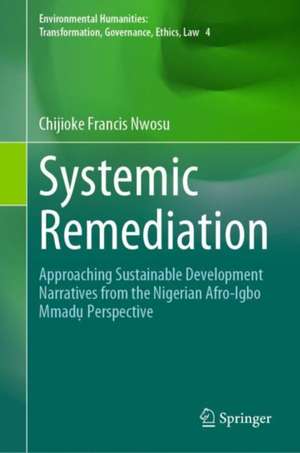Systemic Remediation: Approaching Sustainable Development Narratives from the Nigerian Afro-Igbo Mmadụ Perspective: Environmental Humanities: Transformation, Governance, Ethics, Law, cartea 4
Autor Chijioke Francis Nwosuen Limba Engleză Hardback – 12 sep 2024
The research work presents as its background the hypothesis that varied forms of structures—socio-political, socio-economic, socio-ecological and socio-cultural—unite to constitute ‘structural sins’ (John Paul II) and, consequently, the banes to authentic and sustainable development. These dysfunctional structures were critically analysed and evaluated.
Furthermore, the research work takes up the contemporary discourse on sustainable development, beginning with earlier development concepts, the impactful contribution of social documents of the church to development discourse, the timeline of the general global and sustainable development approach and governance, as well as the specifics of the twin documents of the year 2015, namely Agenda 2030 and Laudato Si. Again, an indigenised manuscript for development discourse known as Nigeria Vision 20:2020 was examined to delineate the fact that forms of indigenous efforts to discuss and administrate the development process are noticeable. However, such efforts have remained negatively exploited by both internal and external man-made corrupt factors. One such factors discussed in this book, among others, is the failure of Nigeria since independence to stabilise its power and energy sector.
Preț: 1126.52 lei
Preț vechi: 1373.81 lei
-18% Nou
Puncte Express: 1690
Preț estimativ în valută:
215.57€ • 226.10$ • 179.45£
215.57€ • 226.10$ • 179.45£
Carte disponibilă
Livrare economică 11-25 martie
Preluare comenzi: 021 569.72.76
Specificații
ISBN-13: 9783031619083
ISBN-10: 3031619080
Pagini: 483
Ilustrații: Approx. 485 p. 56 illus., 16 illus. in color.
Dimensiuni: 155 x 235 mm
Ediția:2024
Editura: Springer Nature Switzerland
Colecția Springer
Seria Environmental Humanities: Transformation, Governance, Ethics, Law
Locul publicării:Cham, Switzerland
ISBN-10: 3031619080
Pagini: 483
Ilustrații: Approx. 485 p. 56 illus., 16 illus. in color.
Dimensiuni: 155 x 235 mm
Ediția:2024
Editura: Springer Nature Switzerland
Colecția Springer
Seria Environmental Humanities: Transformation, Governance, Ethics, Law
Locul publicării:Cham, Switzerland
Cuprins
Nigeria and the People Issues, Facts and Figures.- Practical Inroads The Normative Pathways to Integral Socio Ethical Transformations Four Propositional Normative Steps.
Textul de pe ultima copertă
Since the issues and discourses surrounding sustainable development entered its phase in our contemporary world, the political, social, economic, ecological, and cultural existence of our modern world has inevitably adopted varied measures to respond better to the demands of our time. This book contributes to the global call for transitions and transformations towards a more sustainable human society. This contribution is specific, dialogic and comparative and also has deep cultural and ethnological consciousness based on the Nigerian experiences and, by extension, the African experience.
The research work presents as its background the hypothesis that varied forms of structures—socio-political, socio-economic, socio-ecological and socio-cultural—unite to constitute ‘structural sins’ (John Paul II) and, consequently, the banes to authentic and sustainable development. These dysfunctional structures were critically analysed and evaluated.
Furthermore, the research work takes up the contemporary discourse on sustainable development, beginning with earlier development concepts, the impactful contribution of social documents of the church to development discourse, the timeline of the general global and sustainable development approach and governance, as well as the specifics of the twin documents of the year 2015, namely Agenda 2030 and Laudato Si. Again, an indigenised manuscript for development discourse known as Nigeria Vision 20:2020 was examined to delineate the fact that forms of indigenous efforts to discuss and administrate the development process are noticeable. However, such efforts have remained negatively exploited by both internal and external man-made corrupt factors. One such factors discussed in this book, among others, is the failure of Nigeria since independence to stabilise its power and energy sector.
The research work presents as its background the hypothesis that varied forms of structures—socio-political, socio-economic, socio-ecological and socio-cultural—unite to constitute ‘structural sins’ (John Paul II) and, consequently, the banes to authentic and sustainable development. These dysfunctional structures were critically analysed and evaluated.
Furthermore, the research work takes up the contemporary discourse on sustainable development, beginning with earlier development concepts, the impactful contribution of social documents of the church to development discourse, the timeline of the general global and sustainable development approach and governance, as well as the specifics of the twin documents of the year 2015, namely Agenda 2030 and Laudato Si. Again, an indigenised manuscript for development discourse known as Nigeria Vision 20:2020 was examined to delineate the fact that forms of indigenous efforts to discuss and administrate the development process are noticeable. However, such efforts have remained negatively exploited by both internal and external man-made corrupt factors. One such factors discussed in this book, among others, is the failure of Nigeria since independence to stabilise its power and energy sector.
Caracteristici
Discusses critical issues concerning a society's (Nigeria's) corporate existence Examines development and its possible sustainability from the standpoint of the human person Proposes proposing remedial steps towards capacity building and systemic transformation



